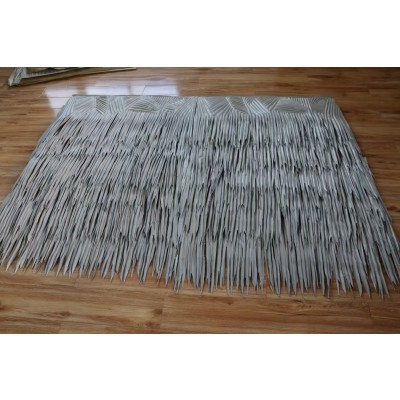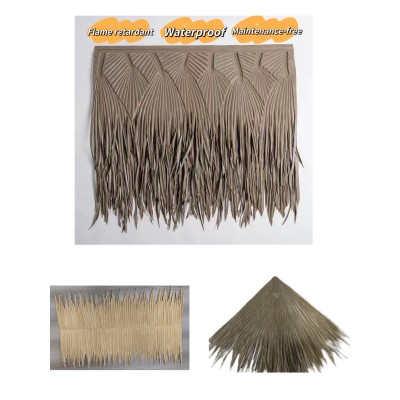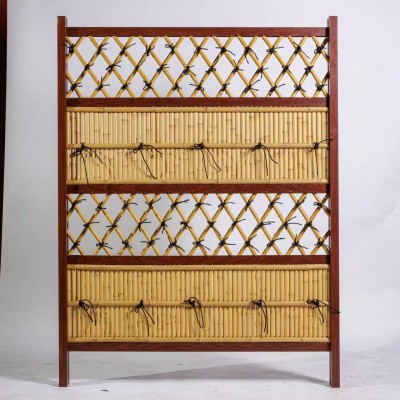Pushing design boundaries - a synthetic thatch roof with a parabolic structure
Pushing design boundaries - a synthetic thatch roof with a parabolic structure
Abstract: This paper discusses the innovative application of synthetic thatch roof with parabolic structure in architectural design. By analyzing its unique design features, technical advantages and contribution to architectural aesthetics and sustainable development, it shows how this new roof structure breaks traditional design boundaries and brings new visual impact and functional value to modern architecture.
I. Introduction
In the field of architecture today, designers are constantly looking beyond traditional design solutions to meet the demand for unique architectural appearance and high-performance building structures. As an innovative design element, synthetic thatch roof with parabolic structure is gradually attracting wide attention. It combines modern materials with classical geometric shapes, opening up new possibilities for architectural design.
Second, the characteristics of the parabolic structure
(1) Unique geometric shape
The parabola shape has the beauty of smooth curves and symmetry, which can give a unique visual effect to the building. The shape is not only aesthetically striking, but also functional. For example, the shape of a parabola can effectively direct rainwater to a specific drainage location, reducing the risk of roof flooding.
(2) Structural stability
The parabolic structure has high mechanical stability. Through reasonable design and calculation, the roof can be stable when bearing various loads and improve the safety of the building. Compared with traditional flat roofs, parabolic roofs can better disperse wind and gravity loads, reducing the possibility of structural deformation.
Third, the advantages of synthetic thatch materials
(1) Simulate natural appearance
The synthetic thatch material can highly simulate the appearance of natural thatch, bringing a natural and warm feeling to the building. At the same time, it can be customized according to the design needs, offering a variety of color and texture options to meet the requirements of different architectural styles.
(2) Durability and weather resistance
Synthetic thatch has excellent durability and weather resistance, and can resist the erosion of natural factors such as ultraviolet light, rain, wind and sand. Compared with natural thatch, it is not susceptible to decay, discoloration and deformation, and has a longer service life, reducing maintenance costs.
(3) Environmental performance
Many synthetic thatch materials are made of environmentally friendly raw materials, recyclable and environmentally friendly. In addition, the synthetic thatch roof also has good thermal insulation properties, helping to reduce the energy consumption of the building, in line with the requirements of sustainable development.
4. Design and application of synthetic thatch roof with parabolic structure
(1) Residential buildings
In residential architecture, the synthetic thatch roof of a parabolic structure can add a unique character and charm to the house. It can be combined with modern architectural styles to create stylish and comfortable living Spaces. At the same time, due to its good thermal insulation and waterproof performance, it can improve the comfort and energy saving effect of the house.
(2) Commercial buildings
For commercial buildings, the unique architectural appearance is one of the important factors to attract customers. The parabolic structure of synthetic thatch roof can bring distinctive visual effects to commercial buildings, enhance brand image and business value. For example, in resorts, hotels, restaurants and other places, this roof structure can create a romantic, casual atmosphere.
(3) Cultural buildings
In cultural architecture, the synthetic thatched roof of the parabolic structure can be combined with traditional cultural elements to show unique regional characteristics and cultural connotations. For example, in the restoration and renovation projects of some historic buildings, the synthetic thatch roof can be used as a combination of traditional and modern design scheme, which not only retains the style of historical buildings, but also meets the functional needs of modern buildings.
V. Technical challenges and solutions
(1) Structural design
The design of the parabolic structure requires precise calculation and analysis to ensure the stability and safety of the roof. Designers need to consider various load conditions, such as wind, gravity, snow loads, etc., and use the appropriate structural materials and connections. At the same time, it is also necessary to design waterproof, heat insulation and other aspects to ensure that the performance of the roof meets the requirements of the building.
(2) Difficulty of construction
The construction of parabolic structure is relatively complicated and requires high technical level and construction experience. The construction process requires precise control of the shape and size of the roof to ensure that the connection of the various parts is tight and smooth. In order to solve the difficulty of construction, advanced construction technology and equipment can be used, such as numerical control machining, three-dimensional modeling, etc., to improve construction accuracy and efficiency.
(3) Material selection
The choice of synthetic thatch materials also needs to consider a number of factors, such as appearance, durability, weather resistance, environmental performance and so on. Designers need to choose the appropriate synthetic thatch material according to the specific requirements of the building and the use environment, and ensure that the quality and performance of the material meet the standards.
Vi. Conclusion
The parabolic structure of the synthetic thatch roof is an innovative solution that pushes the boundaries of traditional design. It combines unique geometric shapes with modern materials to bring a new visual impact and functional value to architectural design. Through reasonable design, construction and material selection, the advantages of this roof structure can be fully utilized to provide unique, beautiful and high-performance solutions for different types of buildings. With the continuous development and innovation of building technology, it is believed that the synthetic thatch roof with parabolic structure will be more widely used in the future architectural design.



